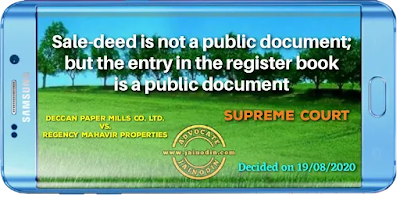Let us see whether section 31(2) makes any difference to this position in law. According to the judgment in Aliens Developers (supra), the moment a registered instrument is cancelled, the effect being to remove it from a public register, the adjudicatory effect of the Court would make it a judgment in rem. Further, only a competent court is empowered to send the cancellation decree to the officer concerned, to effect such cancellation and “note on the copy of the instrument contained in his books the fact of its cancellation”. Both reasons are incorrect. An action that is started under section 31(1) cannot be said to be in personam when an unregistered instrument is cancelled and in rem when a registered instrument is cancelled. The suit that is filed for cancellation cannot be in personam only for unregistered instruments by virtue of the fact that the decree for cancellation does not involve its being sent to the registration office – a ministerial action which is subsequent to the decree being passed. In fact, in Gopal Das v. Sri Thakurji, AIR 1943 PC 83, a certified copy of a registered instrument, being a receipt dated 29.03.1881 signed by the owner, was held not to be a public record of a private document under section 74(2) of the Indian Evidence Act, 1872 for the reason that the original has to be returned to the party under section 61(2) of the Registration Act, 1908 (see p. 87). This judgment has been followed in Rekha v. Ratnashree, (2006) 1 MP LJ 103 by a Division Bench of the Madhya Pradesh High Court, in which it was held:
“8.A deed of sale is a conveyance. A deed of conveyance or other document executed by any person is not an act nor record of an act of any sovereign authority or of any official body or tribunal, or of any public officer, legislative, judicial and executive. Nor is it a public record kept in a State of any private documents. A sale-deed (or any other deed of conveyance) when presented for registration under the Registration Act, is not retained or kept in any public office of a State after registration, but is returned to the person who presented such document for registration, on completion of the process of registration. An original registered document is not therefore a public record kept by a State of a private document. Consequently, a deed of sale or other registered document will not fall under either of the two classes of documents described in section 74, as ‘public documents’. Any document which is not a public document is a private document.
We therefore have no hesitation in holding that a registered sale-deed (or any other registered document) is not a public document but a private document.




